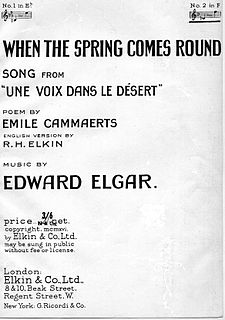Related Research Articles
Sea Pictures, Op. 37 is a song cycle by Sir Edward Elgar consisting of five songs written by various poets. It was set for contralto and orchestra, though a distinct version for piano was often performed by Elgar. Many mezzo-sopranos have sung the piece.
The Crown of India, was a masque, an elaborate theatrical presentation, staged in 1912 to celebrate the visit the preceding December of King George V and Queen Mary to Delhi for their coronation as Emperor and Empress of India. For this masque, the English composer Sir Edward Elgar wrote the music as his Op. 66, with a libretto by Henry Hamilton. The masque consisted of two tableaux: "The Cities of Ind" and "Ave Imperator!".
"Follow the Colours" is a marching song written by the English composer Edward Elgar in 1907, with words by Capt. William de Courcy Stretton. The song is for male voice solo with an optional male voice chorus, accompanied by piano, orchestra or military band.
"Shakespeare's Kingdom" is a poem written by Alfred Noyes and set to music by the English composer Edward Elgar. It was one of the songs written to be performed in the Pageant of Empire at the British Empire Exhibition on 21 July 1924.
"The Islands" is a poem written by Alfred Noyes, and set to music by the English composer Edward Elgar. It was one of the songs written to be performed in the Pageant of Empire at the British Empire Exhibition on 21 July 1924.
"The Heart of Canada" is a poem written by Alfred Noyes, and set to music by the English composer Edward Elgar. It was one of the songs written to be performed in the Pageant of Empire at the British Empire Exhibition at Wembley Park on 21 July 1924.
"Merchant Adventurers" is a poem written by Alfred Noyes, and set to music by the English composer Edward Elgar. It was one of the songs written to be performed in the Pageant of Empire at the British Empire Exhibition on 21 July 1924.
"The Immortal Legions" is a poem written by Alfred Noyes, and set to music by the English composer Edward Elgar. It was one of the songs written to be performed in the Pageant of Empire at the British Empire Exhibition on 21 July 1924.
"Sailing Westward" is a poem written by Alfred Noyes, and set to music by the English composer Edward Elgar. It was one of the songs written to be performed in the Pageant of Empire at the British Empire Exhibition, Wembley Park, on 21 July 1924.
"A Song of Union" is a poem written by Alfred Noyes, and set to music by the English composer Edward Elgar. It was one of the songs written to be performed in the Pageant of Empire at the British Empire Exhibition on 21 July 1924, though this particular song was not performed at the Pageant.
"The Lowestoft Boat" is a poem written by Rudyard Kipling, and set to music by the English composer Edward Elgar in 1917, as the first of a set of four war-related songs on nautical subjects for which he chose the title "The Fringes of the Fleet".

The Fringes of the Fleet is a booklet written in 1915 by Rudyard Kipling (1865–1936). The booklet contains essays and poems about nautical subjects in World War I.
The Pageant of Empire was name given to various historical pageants celebrating the British Empire which were held in Britain during the early twentieth century. For example there was a small Pageant of Empire at the town of Builth Wells in 1909. In 1911 a giant Pageant of Empire took place at the Festival of Empire at the Crystal Palace in Sydenham, where thousands of amateur performers acted out historical scenes The most notable was the Pageant of Empire which took place in London in 1924.

”Quand nos bourgeons se rouvriront”("When the spring comes round") is a song for solo soprano, part of a staged recitation with orchestra Une voix dans le désert written by the English composer Edward Elgar in 1915. The words are by the Belgian poet Émile Cammaerts.
Une voix dans le désert("A Voice in the Desert") is a recitation, with a soprano soloist and orchestra, written by the English composer Edward Elgar in 1915 as his Op. 77. The French words are by the Belgian poet Émile Cammaerts.
Carillon is a recitation with orchestral accompaniment written by the English composer Edward Elgar as his Op. 75, in 1914. The words are by the Belgian poet Émile Cammaerts.
Cecilia McDowall is a British composer, particularly known for her choral compositions.
Martin Yates is a British conductor. He was born in London. After attending Kimbolton School (1969–1974), he studied at the Royal College of Music and Trinity College of Music, London, where his teachers included Bernard Keeffe (conducting), Richard Arnell (composition), Ian Lake, Jakob Kaletsky and Alan Rowlands (piano), and Douglas Moore and John Burden.
"Big Steamers" is a poem by Rudyard Kipling, first published in 1911 as one of his twenty-three poems written specially for C. R. L. Fletcher's "A School History of England". It appears in the last chapter of the book. It is intended for children, with the verses responding with facts and humour to their curiosity about the 'big steamers' - as the merchant ships are called.
Roderick Gregory Coleman Williams OBE is a British baritone and composer.
References
- Foreman, Lewis "Oh, My Horses!: Elgar and the Great War" (Elgar Editions, Rickmansworth, 2001) pp 280–284 ISBN 0-9537082-3-3
- Richards, Jeffrey "Imperialism and Music: Britain 1876-1953" (Manchester University Press, 2002) ISBN 0-7190-4506-1